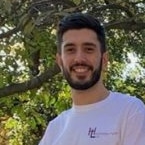
Abstract 1340. The role of chemokines CCL8 and CCL12 in diffuse intrinsic pontine gliomas.
What are your long-term career objectives?
My ultimate career goal is to obtain an independent faculty position at a recognized university. In addition to my scientific training, I have dedicated important efforts to improve my teaching and mentoring skills, and I would like to combine these two passions by applying for a joint position of research and education. I genuinely believe that being involved in the education of future generations is also essential for researchers since intercommunication with students enhances our mentoring skills while progressing our scientific careers. During the past months, I have been actively involved in rotating student’s training and I will participate as a teaching assistant in a course organized by Dr. Hambardzumyan this semester. In addition, we have submitted an application that will fund Argentinian PhD students’ six-months rotations in our group, where I will be the trainee’s co-mentor. During my PhD studies, I have completed the objectives that constitute the first steps of my career as a scientific researcher while studying nerve-associated macrophages in the context of peripheral nervous system injury to accelerate nerve recovery. For my postdoctoral fellowship, I decided to get immersed in the thrilling but competitive field of immuno-oncology. Even though I haven’t been trained in cancer biology, I believe I have the professional and personal qualities to make important discoveries in this field. My immediate endeavor is to expand my technical expertise, improve my written and spoken scientific communication skills, and establish new scientific collaborations with the goal of starting my own line of research. Training in such a recognized institution as the Icahn School of Medicine at Mount Sinai, in the highly collaborative and intellectually stimulating environment of Dr. Hambardzumyan’s group, will help me achieve my goals. Obtaining the AACR Minority Scholar in Cancer Research Award will allow me to discuss my results with the most recognized scientists in the field, establish scientific collaborations that will potentiate my ongoing research, and get inspired by speakers and colleagues that will attend the AACR meeting.
Please share information about how the COVID-19 pandemic has impacted your research over the last two years.
I finished my PhD in July 2019. After defending my thesis I focused on my teaching training while interviewing for postdoctoral positions. In January 2020, I accepted the position at Dr. Hambardzumyan’s laboratory and started the paperwork to move from Buenos Aires to New York. However, the COVID-19 pandemic hit, and my J1 visa process stopped. It wasn’t until July 2020 that I managed to get an emergency appointment at the US Embassy and a ticket on the only flight departing from Argentina to the US (airports were closed in my home country). When I arrived in New York, I had to quarantine for 14 days before starting my new position. Starting a new job, in a new city in such uncertainty was tough. Nevertheless, overall I was lucky because I managed to move in the middle of the pandemic while other colleagues had to wait until the end of 2020. However, taking into consideration all the issues and delays, I can say that I fully started my postdoctoral training almost one year after the original start date.